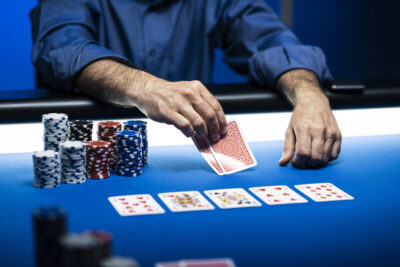I know most of our readers are recreational players. There’s nothing wrong with that at all. In fact, for 99% of people, it’s the best way to approach poker and earn a nice part-time income. However, there are things professionals do at the table that you can do too, to help your win rate improve. I’m confident if you follow the suggestions in this article combined with solid Texas Hold’em strategy, you will see better results at the poker tables, both live and online.
Observe Everything
Poker is a game of information. We’re all trying to make the best decisions possible, with the information available. Professionals recognize this and it’s why their attention is high. They observe everything going on at the table as they know one piece of information could be the difference between making a great decision e.g. a hero call.
It may seem generic to say “observe” the table. But cast your mind back to previous sessions. Are you really paying attention? Or are you chatting to the player next to you? Eating food or scrolling through your phone? Perhaps you’re not doing anything distracting but you’re still not truly observing what is going on.
This tip is particularly important in live play as you need to have recall as to what happened. You can’t click hand history like we can online and watch back the action easily. Online, pro’s are optimizing the number of tables they play so they maintain excellent attention. How many tables do you play? Take our quiz below to find out what the right number is for you.
Calculate on the Spot
As you know, calculating odds and probabilities is part and parcel of poker. You probably have a decent grasp of the basic odds like outs counting or chances of making a flush from the flop. But, do you often calculate the likelihood your opponent is bluffing on the river?
Most recreational players use odds retrospectively or justify decisions afterwards by saying they had a nice price. This is not the way a professional player works. They operate in real time, not in retrospect. Thus, they are making more objective decisions, not influenced by the results.
To calculate on the spot takes concentration and a clear mind. You need to quickly compute the pot odds and use estimations based on your history with the opponent. These approximations are much more likely to help you make a profitable decision than acting solely on instinct. Give it a try in future sessions and see for yourself.
Optimized Value Bet Sizing
Recreational players have a habit of bashing the same buttons or post-flop bet sizes. Whilst there is an argument for saying consistent sizing can be less exploited, it’s rarely the optimal bet size. A professional poker player is less prone to automatically betting a defined percentage of the pot. They will read the context of the hand and make a carefully considered bet they think will earn them the most.
This is a huge advantage the pro has over the amateur. After all, assuming luck evens out, an amateur will earn far less from a value hand against a pro than the other way around. The better player knows how to make an accurately sized value bet.
If you feel like you struggle with value betting and need help, get in touch below and we will help you develop this area of your game.



